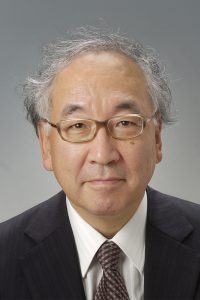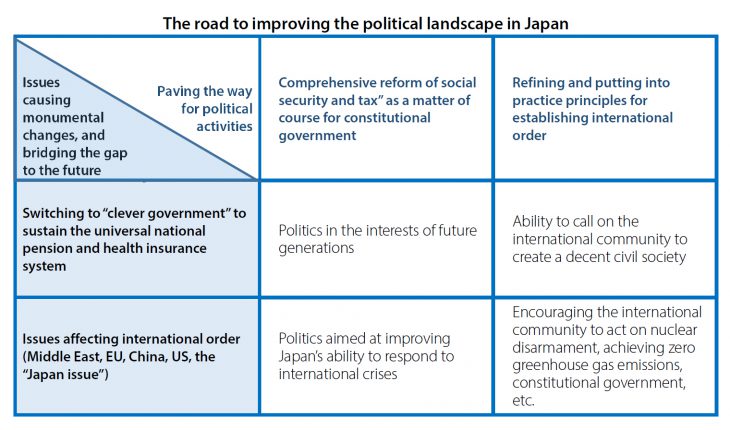Interpreting the Upper House Elections: Two concerns about maintaining the status quo ― Sustaining social security and Japan’s policy towards China
< Key Points >
- Difficult international conditions forcing a decision on maintaining the status quo
- Need to take political action to avoid the collapse of the universal pension and health insurance system
- Diplomatic measures to prevent issues surrounding the Senkaku Islands from escalating into military conflict

Tanaka Naoki, President, Center for International Public Policy Studies
The Upper House elections saw a fourth consecutive national election victory for Prime Minister Abe Shinzo. On the domestic front, one of the reasons behind voters’ decision was down to expectations of the Japanese market broadening its horizons, as a result of current economic policy and progress with the Trans-Pacific Partnership (TPP) agreement. In particular, domestic restrictions standing in the way of the TPP would have remained unresolved under any administration other than Abe.
Another reason why voters chose to retain the current administration was down to fundamental concerns regarding Japan’s involvement in the international community. Amidst growing friction with the likes of China and South Korea, there has inevitably been a degree of reluctance to criticize the government at home. At research seminars in locations such as Beijing and Seoul, I have told audiences that “support for Prime Minister Abe has undoubtedly been bolstered under your current leaders.” Harsh realities such as these effectively restricted the options open to Japanese voters.
At the same time, we mustn’t overlook an increased tendency towards maintaining the status quo, as a “precaution” for Japan in the face of upheaval in the international political landscape, not least the emergence of Donald Trump as the Republican candidate in the US elections and the UK’s referendum in favor of leaving the European Union (EU).
Under the administration of Barack Obama, the United States has adopted a rebalancing policy that has seen a shift in the focus of its involvement in Asia. The furor surrounding Trump however has led to a noticeable resurgence in “Americanism.” With the international status quo under threat, there is unlikely to be much momentum in terms of changing the structure of the Japanese government.
This drive towards maintaining the status quo in Japan was most likely triggered by clear signs of turmoil in the EU. From Japan’s point of view, the EU has always been the model of regional integration. Compared to other major countries, Japan stands alone in that it has never been able to work towards economic integration with its neighbors, let alone political or social integration. If we were to gain a reputation for ignoring global trends, there was always a risk that Japan might stand out within the international community solely for its “otherness.” Now however, everything has changed in the EU.
No doubt a considerable number of voters felt that maintaining the status quo seemed like a reasonable solution for Japan. One could say that the wind was blowing in the right direction in terms of confidence in the Abe administration.
*** ***
With that in mind, what are the medium- to long-term implications of maintaining the status quo as an option for Japanese politics? There have been countless factors that have threatened to throw things off course to date. The following section takes a look at two key points – the sustainability of social security financing and the “Japan issue” in the context of cooperation with the international community – and offers a perspective on essential new standards for the Japanese political landscape. We need to start working on political solutions to the issues that are undoubtedly going to face future generations in Japan, as soon as possible.
Established under the government of Kishi Nobusuke (in office as the 57th Prime Minister from February 1957 to July 1960), Japan’s universal pension and health insurance system boasted world-leading problem solving capabilities. This was followed by a period of rapid economic growth in Japan, as it became one of the few countries in the world with an “everyone is middle class” mentality. Looking ahead to Japanese society in the future however, one can’t help but notice the vulnerability of social security financing.
From the point of view of contributions to social security, the reality is that we are seeing an unwanted increase in irregular employment, particularly amongst younger generations. In a situation where working generations are required to support the elderly, the ratio is shifting from three-to-one to almost one-to-one. That figure however is simply the result of dividing the number of people in each generation by one another. With the working generation supporting the elderly on their shoulders, the key point here is whether their shoulders are strong enough. Things have changed since the days of “everyone is middle class.”
This harsh reality is again evident from the point of view of those contributing to national health insurance. Intended mainly for employees at small- and medium-sized companies, as well as retired workers, the gap between expenditure on health insurance benefits and insurance contributions is inevitably widening. The government is keen to avoid using tax revenue to cover the national health insurance deficit, and has therefore continued to shift the burden onto the National Federation of Health Insurance Societies, whose membership consists of employees at larger companies. There are more and more cases in which employees enrolled in health insurance societies are contributing nearly 10% of their income. Even taking into account pay rises, people are seeing no increase in their disposable income after deduction of taxes and social insurance contributions, which in turn has led to an ongoing slump in consumer spending.
Taxes already account for half of all national pension benefits. Health insurance contributions as a percentage of personal income can only be increased so far. There is a growing weight of opinion that the government won’t be able to avoid increasing funding from taxes in order to sustain the social insurance system.
In addition to pension and medical expenses, other areas in which social welfare payments are on the increase include nursing and child care. If we think about health insurance benefits in terms of an overall balance along these lines, there is an evident need to restrict benefits to a level that would be acceptable to the Japanese people.
The universal national pension and health insurance system has served as a safety net for individual citizens for over half a century. If that net were to break, the Japan that we know would be gone forever. A review into health insurance is also needed from the payment side of things, in the interests of maintaining the current system. This isn’t a question of “big government” versus “small government.” Nobody wants to see the universal pension and health insurance system collapse. What we need is “clever government,” based on activities that take their lead from the actions of experts.
*** ***
Another issue where we need to bridge the gap to the future is the establishment of foreign and security policies that ensure Japan’s autonomy. All over the world, there are signs of international order becoming frayed around the edges. Terrorist attacks originating from conflict in the Middle East are shaking the very foundations of our modern world. Increasingly serious issues facing the EU are another key factor.
There is also the “China issue,” resulting from China unilaterally threatening freedom of navigation on the South China Sea, irrespective of rulings from the court of arbitration. The “US issue” meanwhile relates to the United States’ basic policy on international involvement, and the difficulties that poses in terms of securing domestic agreement.
It is against this backdrop that the “Japan issue” has been raised, mainly by experts in Europe and the United States. The issue in question relates to controlling Japan-China relations surrounding the Senkaku Islands (Okinawa prefecture). Essentially, it is conceivable that disputes surrounding these uninhabited rocky islands could escalate into military conflict between the United States and China.
There were high hopes that the policy of US involvement in protecting the Senkaku Islands would help to deter Chinese incursions. At present however, it is uncertain as to whether that deterrent is proving effective. This raises the issue of whether or not Japan has any diplomatic options that could prevent military conflict from escalating. With the seeds of conflict being sown all over the world, this underlines just how important it is for Japan to use its independence to keep issues contained.
There are those who believe that merely bringing up the Japan-US alliance is not the right way to resolve this issue. We should regard the alliance as a last resort for security under extreme circumstances. It is not something we should test.
*** ***
We need to improve the political landscape in Japan, as a matter of urgency. “Comprehensive reform of social security and tax” has been put forward, chiefly by the two main parties, as a serious way for the current working generation to help future generations. This should form the basis of ongoing efforts to create a better political landscape, as a matter of course for constitutional government. It should also be used as a means of countering anticipated threats for the future, through the establishment of fiscal discipline.
At the same time, Japan needs to make a concrete contribution to establishing international order. We should also continue to serve as an example for the creation of a decent civil society. Developing the principle of “clever government” is a prime example. Japan can differentiate itself in relation to specific political issues, including calling on the international community to abolish nuclear weapons, achieving zero emissions of greenhouse gases (man-made emissions), and establishing a constitutional approach based on a legal system where authority is binding. We need to turn the tide of Japanese politics in a new direction, now more than ever.
Translated by The Japan Journal, Ltd. The article first appeared in the “Keizai kyoshitsu” column of The Nikkei newspaper on 15 July 2016 under the title, “Saninsen wo do yomitokuka (1): “’Genjoiji’ ni Futatsu no Fuan ― Shakaihosho Iji to Taichu-seisaku” (Interpreting the Upper House Elections (Part 1 of 3): Two concerns about maintaining the status quo ― Sustaining social security and Japan’s policy towards China)” The Nikkei, 15 July 2016, p. 33. (Courtesy of the author)


